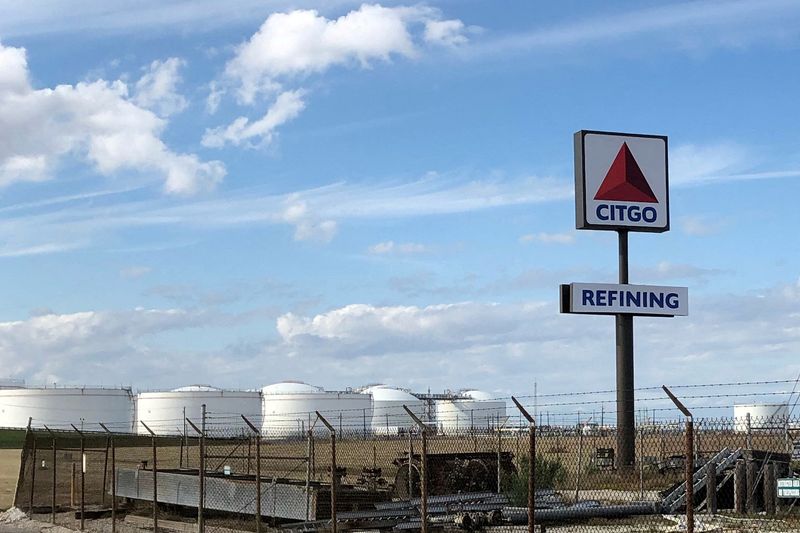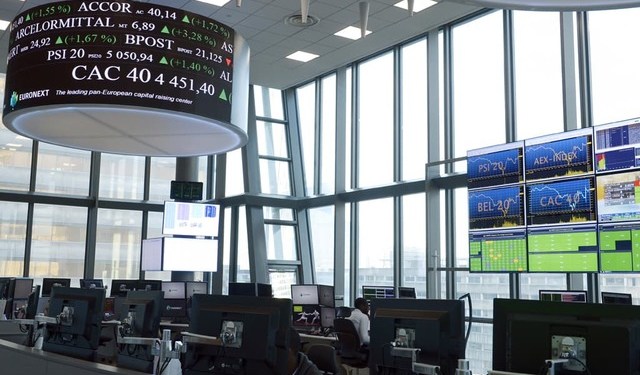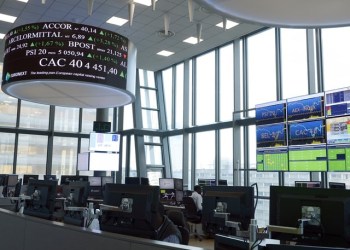
© Reuters. FILE PHOTO: Citgo Corpus Christi Refinery is seen in Corpus Christi, Texas, U.S., January 25, 2019. Picture taken on January 25, 2019. REUTERS/Erwin Seba/File Photo
COP
+2.18%
Add to/Remove from Watchlist
Add to Watchlist
Add Position
Position added successfully to:
Please name your holdings portfolio
Type:
BUY
SELL
Date:
Amount:
Price
Point Value:
Leverage:
1:1
1:10
1:25
1:50
1:100
1:200
1:400
1:500
1:1000
Commission:
Create New Watchlist
Create
Create a new holdings portfolio
Add
Create
+ Add another position
Close
By Marianna Parraga
HOUSTON/MIAMI (Reuters) – The highest bid received in a U.S. auction of shares that will decide the fate of Venezuela-owned oil refiner Citgo Petroleum was $7.3 billion, enough to cover only a third of court-approved claims, two people familiar with the matter said.
A federal court in Delaware is auctioning the shares of a parent of Venezuela’s foreign crown jewel, Houston-based Citgo, that it found liable for the South American country’s debt defaults and expropriations. Creditors have flocked to Delaware to press claims totaling $21.3 billion in a case first brought nearly seven years ago by miner Crystallex.
Results from the first bidding round in January, however, show a sales process that is unlikely to provide a satisfactory outcome for creditors or Citgo’s current owners. Offers received thus far in a case that broke new legal ground in sovereign immunity would leave many claims unpaid, analysts and sources warned.
The court may have to revamp the sales process, or consider an alternative being drafted by Venezuela, which would offer creditors a larger payout with proceeds spread over several years, while retaining some of Venezuela’s stake in the company, the people said.
Judge Leonard Stark, who is overseeing the case, has declined to consider Venezuela’s payment proposals, the people said. It is unclear if he would reconsider with the highest offer in the initial bidding round covering only 14 of the 26 claims that he has accepted from 18 creditors.
The weak initial bids were below the $13 billion to $14 billion value specialists appointed by the court had estimated for the shares. That shortfall is prompting Citgo’s parent companies and boards to reprise an offer presented earlier this year: a $10 billion payment funded over time from Citgo profits, equity and borrowings.
EXTRA INNINGS
The auction has drawn interest from oil giant ConocoPhillips (NYSE:COP) and units of conglomerate Koch Industries, both putting their claims against Venezuela via credit bids for the assets.
Other offers came from energy companies and private investors wanting to acquire the PDV Holding shares to gain control of the seventh-largest U.S. oil refiner by volume, the people said.
Spokespeople for Conoco, Citgo and boards supervising the refiner declined to comment. Koch Industries and attorneys for the court official overseeing the auction did not reply to requests for comment.
PDV Holding’s only asset is Citgo, which owns three U.S. refineries, oil storage terminals and pipelines, and controls a retail distribution network.
Citgo has been highly profitable, earning $4.8 billion in profits in the last two years.
The 12 non-binding offers received in January, however, reflect concerns over the future value of refiners with intense carbon footprints and Citgo’s troubled ties with Venezuela’s state oil firm PDVSA, which remains under socialist President Nicolas Maduro’s grip, the people said.
A lawyer representing Citgo had called the first bidding round “disappointing.”
The court is expected soon to set a second, binding round, but prospects of an offer higher than the non-binding $7.3 billion are slim, the people added.
Court officials involved in the case “will need to sit down with Venezuela and get together something that will make sense,” said a person close to the auction process.
Venezuela’s $10 billion proposal would provide creditors with a combination of cash, securities and shares in Citgo over a three-year period. It would ultimately allow Venezuela to retain about half ownership.
“We have only been doing damage control so far. We want to move the ball forward, the game has not finished,” one of the people familiar with Venezuela’s proposal said.
POLITICAL MISSILES
Venezuelan entities overseeing Citgo want to tie the payment plan to stronger U.S. protection for the refiner from creditors as Maduro’s government refuses to reverse a ban on opposition candidate Maria Corina Machado from running for president, closing what Western countries saw as a path towards democracy in Venezuela.
The idea includes pulling the Venezuela-related claims out of the court case and into the U.S. Foreign Claims Settlement Commission (FCSC), a quasi-judicial independent agency within the Justice Department, for better addressing all of Venezuela’s creditors.
Plan advocates are expected to discuss the proposal with U.S. officials, possibly including Secretary of State Antony Blinken ahead of the April 18 expiry of a U.S. license that relaxed sanctions on Venezuela’s energy sector.
Unifying Venezuela’s fractious opposition around a proposal, however, has been cumbersome and convincing Washington could be even more challenging, the sources acknowledged. Some politicians and members of Citgo’s supervising boards believe that having Machado in agreement would give the company a better chance of winning U.S. support.
The plan also would require the U.S. Treasury Department, which last year green-lit the auction, to agree to the offer, and the Delaware court could be forced to halt or freeze a sales process it fought hard to advance.
Spokespeople for Machado and Gerardo Blyde, who represents opposition parties negotiating with the Maduro administration, did not provide comment. The U.S. State and Treasury departments did not immediately provide comment.
“We need a bullet-proof effort this time,” one of the people behind the ideas said referring to getting top opposition politicians well connected to Washington to lead the initiative.
Source: Investing.com



























